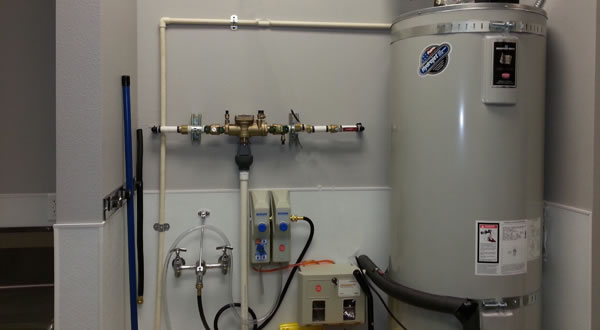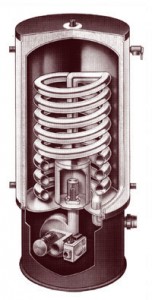Tankless water heaters provide on-demand hot water, while boilers offer consistent radiant heat. Both have unique benefits for different needs.
Tankless water heaters and boilers are popular choices for home heating. Tankless water heaters heat water only when needed, reducing energy consumption. They are compact and can be mounted on walls, saving space. Boilers, on the other hand, provide continuous radiant heat through floor or wall-mounted systems.
Boilers are ideal for larger homes or spaces requiring constant warmth. Each system has its pros and cons, depending on your specific heating requirements. Choosing the right one depends on factors like energy efficiency, installation space, and your heating preferences. Understanding these differences will help you make an informed decision.
Page Contents
Tankless Water Heater Basics
Water flows through the tankless heater. The heater warms water instantly. This process ensures you get hot water quickly. There is no need to store hot water. This saves energy and space. Tankless heaters use powerful burners to heat water. They only work when you need hot water. This feature makes them very efficient.
- Energy efficient design
- Compact size saves space
- Instant hot water supply
- Longer lifespan than traditional heaters
- Lower operating costs over time
Boiler Basics
Explore the efficiency and convenience of tankless water heaters versus boilers for radiant heat systems. Discover the benefits and drawbacks of each option to make an informed decision for your home heating needs.
Functionality Overview
Boilers heat water to create steam or hot water. This heat then moves through pipes to radiators or underfloor heating systems. Boilers are great for large homes. They can heat big spaces evenly. They use natural gas, oil, or electricity as fuel.
Boilers are efficient and can save on energy bills. Some modern boilers have smart controls. These controls make it easy to adjust temperatures. Boilers can also provide hot water for showers and taps. They are a key part of many heating systems.
Main Components
| Component | Function |
|---|---|
| Burner | Burns fuel to create heat. |
| Heat Exchanger | Transfers heat to the water. |
| Circulator Pump | Moves hot water through the system. |
| Expansion Tank | Handles pressure changes in the system. |
| Radiators | Release heat into rooms. |
Efficiency Comparison
Comparing efficiency, tankless water heaters offer on-demand heating, reducing energy waste, while boilers provide consistent radiant heat. Both systems have distinct benefits for radiant heating needs.
Energy Consumption
Tankless water heaters use less energy. They heat water only when needed. This reduces energy waste. Boilers, on the other hand, keep water hot all the time. This uses more energy. Tankless systems are often more efficient. They can save money on energy bills.
Performance can vary between models. Some tankless heaters may work better in small homes. Boilers might be better for larger spaces. Always check the energy efficiency ratings. This helps in choosing the best option.
Performance Metrics
Boilers can heat large areas evenly. They provide consistent warmth. Tankless heaters may struggle with multiple zones. Performance can drop if many taps are used at once. Boilers are often more reliable for big homes.
Maintenance is also a key factor. Boilers need more frequent checks. Tankless heaters usually require less upkeep. This can affect long-term performance. Choose based on your home’s needs and budget.

Credit: m.youtube.com
Installation Considerations
Installing a tankless water heater offers space-saving benefits and energy efficiency. Boilers, on the other hand, provide consistent heat distribution for radiant systems. Consider the specific heating needs and installation space before deciding.
Space Requirements
A tankless water heater is small and can fit on a wall. It saves floor space. A boiler usually takes up more room. It might need a dedicated area. Think about how much space you have before choosing.
Complexity And Cost
Tankless water heaters are easier to install. They cost less to set up. Boilers are more complex. Installation can be more expensive. Ongoing maintenance might also cost more with a boiler. Choose based on your budget and technical skills.
Maintenance Requirements
Both systems need regular checks. Tankless water heaters need filter cleaning. Boilers need pressure checks often. Filters should be cleaned every few months. Pressure levels must stay within safe limits. Regular inspections help catch problems early. This keeps the system running smoothly. Always follow the manufacturer’s guidelines.
Tankless water heaters can face mineral buildup. This can block water flow. Boilers may face leaks. Leaks can damage floors and walls. Both systems can have thermostat issues. A broken thermostat means no heat. Fix these issues quickly to avoid more problems. Use a professional for repairs when needed.
Cost Analysis
Tankless water heaters cost less upfront. They are usually $500 to $1,500. Boilers are more expensive. Their price ranges from $3,000 to $5,000. Installations for both can add extra cost. Tankless water heaters have simpler setups. Boilers need more complex installations. This makes boilers pricier initially.
Tankless water heaters save money over time. They use less energy because they heat water only when needed. Boilers may cost more in the long run. They use more energy to keep water hot. Maintenance costs also differ. Tankless units need less frequent servicing. Boilers require regular check-ups. This can add to the long-term expenses.
Suitability For Radiant Heat
Tankless water heaters provide instant hot water. These heaters are energy-efficient. They can struggle to maintain a constant temperature. Radiant heat systems need steady warmth. Boilers are better at keeping temperatures stable. They can heat large areas effectively.
Tankless water heaters are compact. They fit in small spaces easily. These heaters are not always compatible with radiant heat systems. Boilers are designed for radiant heat. They work well with these systems. Boilers can handle the higher demands of radiant heat. They also last longer than tankless heaters.

Credit: bfplumbingbayarea.com
Environmental Impact
Tankless water heaters are more efficient than boilers. They use less energy. This means they have a smaller carbon footprint. Boilers often burn fossil fuels. This releases more carbon dioxide into the air. Choosing a tankless water heater can help reduce air pollution.
Tankless water heaters last longer than boilers. They can last up to 20 years. Boilers usually last about 10-15 years. Longer-lasting products are more sustainable. They reduce waste and save resources. Tankless water heaters also use less water. This helps conserve water for the planet.

Credit: www.radiantec.com
Frequently Asked Questions
Can A Tankless Water Heater Be Used For Radiant Heating?
Yes, a tankless water heater can be used for radiant heating. It provides efficient, on-demand hot water for heating systems. Ensure compatibility with your radiant heating setup.
What Is The Best Way To Heat Water For Radiant Floor Heating?
The best way to heat water for radiant floor heating is using a high-efficiency boiler. It provides consistent heat.
Can A Tankless Water Heater Replace A Boiler?
A tankless water heater can replace a boiler for providing hot water. It is not ideal for heating systems.
What Is The Most Efficient Heat Source For Radiant Floors?
The most efficient heat source for radiant floors is a hydronic system with a gas boiler. This system provides consistent and cost-effective heating.
Conclusion
Choosing between a tankless water heater and a boiler for radiant heat depends on your needs. Tankless heaters are energy-efficient and space-saving. Boilers provide consistent, powerful heating. Assess your home’s requirements and budget to make the best decision. Both options can offer comfort and efficiency for your radiant heating system.
